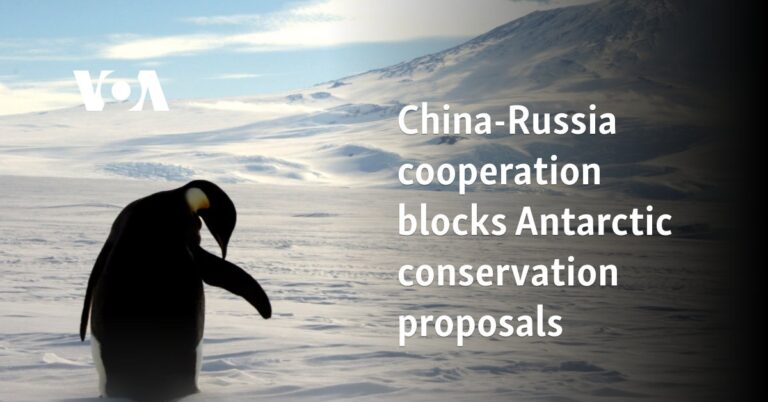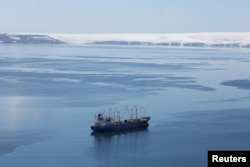China and Russia are deepening cooperation in Antarctica, a trend that analysts say could undermine marine conservation efforts and disrupt the long-standing status quo in the resource-rich region.
China and Russia have proposed significant proposals to establish new marine reserves and revise the krill fisheries management plan in the Southern Ocean during the Commission for the Conservation of Antarctic Marine Living Resources (CCAMLR) annual conference in Australia. He was accused of cooperating to stop the attack. last week.
The Commission was established in 1982 and is part of the Antarctic Treaty system, which establishes the legal status of Antarctica and is made up of four different treaties.
CCAMLR focuses on protecting Antarctic marine life and other resources. The commission has 26 member countries, including China, Russia, the United States, Australia, and the European Union.
Any member state can veto proposed measures, and Russia and China have repeatedly used that power over the years to block conservation proposals by the council.
Some member states said all measures proposed at this year’s conference, including the creation of four new marine protected areas and the extension of existing krill management measures, were blocked by China, Russia, or both. .
A spokesperson for the Australian Antarctic Division told VOA in a written statement: “Our biggest concern is that while the harmonization process continues, some member states did not support extending existing krill management measures.” I answered.
“This is a setback for CCAMLR and will put krill, the ecosystems and predators it supports, at risk,” the spokesperson added. Krill are small shrimp-like crustaceans that play an important role in the marine food chain.
Krill fishing restrictions
The measure CCAMLR member states want to maintain is a system that limits krill fishing in protected areas near the Antarctic Peninsula to no more than 620,000 tonnes.
A further 620,000 tonnes of catchable krill will be redistributed to several sub-areas to prevent over-concentration of krill fishing in one area.
This measure must be approved by all Commission member states and updated annually during the CCAMLR meeting. Analysts said moves by China and Russia to block the rollback of krill regulations would impact the sustainability of a key food source for species such as penguins, seals and whales.
“Too much krill fishing in small areas of Antarctica limits the amount of food available to seal and penguin populations,” Tony Press, an Antarctic affairs expert at the University of Tasmania, said in a video interview with VOA. He spoke at .
In his view, other countries within the CCAMLR should either block the proposed conservation measures through diplomatic means or decide to implement the proposed measures without involving China or Russia. Efforts should be made to collectively challenge decisions.
“Looking at the actions of Russia and China, other countries may also decide that they must start implementing the decision among themselves,” Press said.
Experts say China and Russia are refusing to support the proposed measures because they believe that establishing more marine reserves would make more areas of Antarctica unavailable for use or development. He says it’s because there are.
“They believe that once a marine reserve is adopted, it will have a snowballing effect, creating further support behind the development of additional marine reserves, which will allow the development of all marine living resources in the Southern Ocean. “Both countries believe that it could be banned completely,” said Donald Rothwell, a professor of international law at the Australian National University.
Linda Goldsworthy, a research scientist at the University of Tasmania’s Institute of Marine and Antarctic Research, said one of China’s aims in expanding its fishing operations in the Southern Ocean was to “increase its geopolitical influence in the Antarctic region”. .
But Goldsworthy said the decision to block marine conservation efforts in Antarctica was driven by an attempt to challenge the rules-based world order, as Russia is not investing as much in the Southern Ocean as it used to.
“Russia is playing the role of destroyer, [the objections] is part of their global disruptive approach,” she told VOA by phone.
The Russian Ministry of Foreign Affairs and the Russian Embassy in the United States did not respond to VOA’s requests for comment. China’s Ministry of Foreign Affairs and the Chinese Embassy in Australia also did not respond to requests for comment from VOA.
CCAMLR successfully established two marine reserves in the Southern Ocean in 2009 and 2017, but no new reserves have been established since then. The four new zones proposed during the 2024 conference would increase protected areas in the Southern Ocean to 26%.
Current situation in Antarctica
Deepening cooperation between China and Russia in Antarctica comes as Beijing expands its presence across the continent. In February, China opened a new scientific research base near a US research base. The development has raised concerns among some security analysts that China could collect intelligence or develop dual-use capabilities through the station.
China’s growing presence in Antarctica has enabled the Chinese government to assert its policies more boldly in some regional institutions, such as CCAMLR, the Press said.
He told VOA that China’s actions at last week’s meeting were “a sign of confidence because China is now a party with a significant presence in Antarctica.”
“A lot of what they do is [China and Russia] They have suggested the idea that the actions they are taking now are to avoid inhibiting actions they may take in the future,” Press added.
Mr Goldsworthy said growing synergies between China and Russia in Antarctica could pose potential challenges to the Antarctic Treaty system.
“Penguin conservation is being thwarted in Antarctica, and I think Russia and China are both positioning themselves.” [mineral mining] When and if the current mining ban will be lifted,” she told VOA.
Although the Chinese and Russian governments have consistently blocked CCAMLR proposals, Rothwell said it was unclear whether that trend had “fully influenced decision-making within the Antarctic Treaty.” . The treaty designates Antarctica as a demilitarized zone for peaceful purposes and scientific research.
Even though China and Russia cannot easily challenge this treaty, to fulfill its desire to exercise control and influence in Antarctica, China believes it is advantageous to work with Russia. “I guess so,” Rothwell said.
Goldsworthy said that if China and Russia maintain a “warlike approach” to the Antarctic Treaty system, including CCAMLR, a “safe and secure region” could turn into a continent with “much less peaceful aspirations.” He added that there is.


